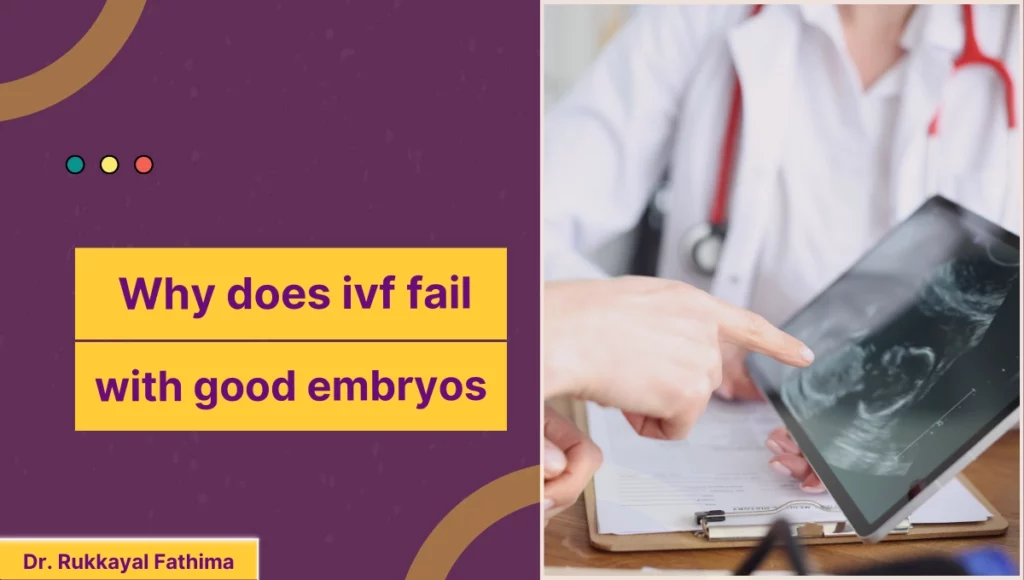In an IVF treatment, one of the major factors that cause IVF failure is the quality of your embryos. A poor-quality embryo is highly susceptible to genetic and chromosomal abnormalities and might have trouble developing healthily till childbirth.
Most times, doctors prefer good-quality embryos and choose the best one among the other embryos for embryo transfer. However, even then, you might experience an IVF failure sometimes.
This might be confusing for you. So, in this article, we will discuss some other factors that can cause IVF failure despite a good embryo and what you can do to make IVF successful.
Why Does IVF Fail Despite Good Embryos?
Having a good-quality embryo is important, and it is the first step towards having a successful IVF pregnancy. A high-quality embryo ensures that the developing baby will be healthy without any genetic or developmental abnormalities.
However, even with careful analysis and preparation, your IVF cycle might fail sometimes. Here are some factors that can cause IVF failure despite having a good-quality embryo.
Quality Of Embryos
Sometimes, the embryo might seem healthy and of high quality under the microscope. However, it might have certain or genetic issues that have escaped your examination. When you transfer these embryos, they might have implantation issues or developmental abnormalities, leading to miscarriage and IVF failure.
Implantation Issues
During implantation, your uterus must be receptive enough to receive the embryo and nourish it throughout pregnancy. Your uterus should also have enough endometrial tissues to cushion the embryo.
If your uterus if not ready to implant the uterus, then even with a high-quality embryo, you can’t achieve IVF success.
Hormonal Imbalance
Your hormones, especially progesterone should be at an optimum level to maintain the pregnancy and nourish the baby till childbirth. Progesterone is also called the “pregnancy hormone.” So you know how important progesterone is during pregnancy.
Your fertility doctor will give you progesterone medication if you have insufficient progesterone levels. However, you might experience an IVF failure if you do not have enough progesterone in your body.
Lifestyle Factors
Certain unhealthy lifestyle factors like smoking, alcohol, drugs, obesity, stress, etc., can cause IVF failures despite a good-quality embryo. So, at least three months before starting IVF, try following a healthy lifestyle like a healthy diet, regular exercise, weight & stress management, etc.
Tips To Make IVF Treatment Successful
Here are some effective tips you can follow to make your IVf cycle more successful.
A healthy diet
Instead of unhealthy junk and processed foods, take a healthy diet with fruits, vegetables, whole-grains, etc.
Regular exercise
Don’t forget your regular dose of exercises. However, do mild exercises. High intensity workouts can give you the opposite effect.
Get enough sleep
Adequate sleep promotes overall health and hormonal balance. You need to get at least 7 to 8 horse of uninterrupted sleep for a healthy mind and body.
Take supplements regularly
Don’t miss it, and take the multivitamin supplements your doctor recommended on time.
Manage stress
Stress can impact your hormone levels and affect your IVF success rates. Manage your stress by following relaxing activities like yoga, meditation, etc.
Conclusion
Do not worry too much if you have an IVF failure despite having a good embryo. There are many reasons that can cause IVF failure than the quality of your embryos.
If you experience a failed IVF, talk with your fertility doctor, do the necessary tests, and identify the root cause of the issue. You can expect an increase in success rate if you try IVF again after treating the issue.
An IVF failure can happen during any stage of the process. It can happen during fertilization, embryo culture, or even in the uterus after embryo transfer. You need to wait at least until your first trimester is over to confirm that you will have a successful IVF pregnancy.
There are many factors that can determine whether your IVF cycle will be a success. People with good-quality embryos might have implantation issues, and women with good uterine receptivity might have bad-quality embryos.
Several factors, like your poor uterine receptivity and uterine abnormalities like polyps, adhesions, etc., can cause a healthy, high-quality embryo to not implant into your uterus.








